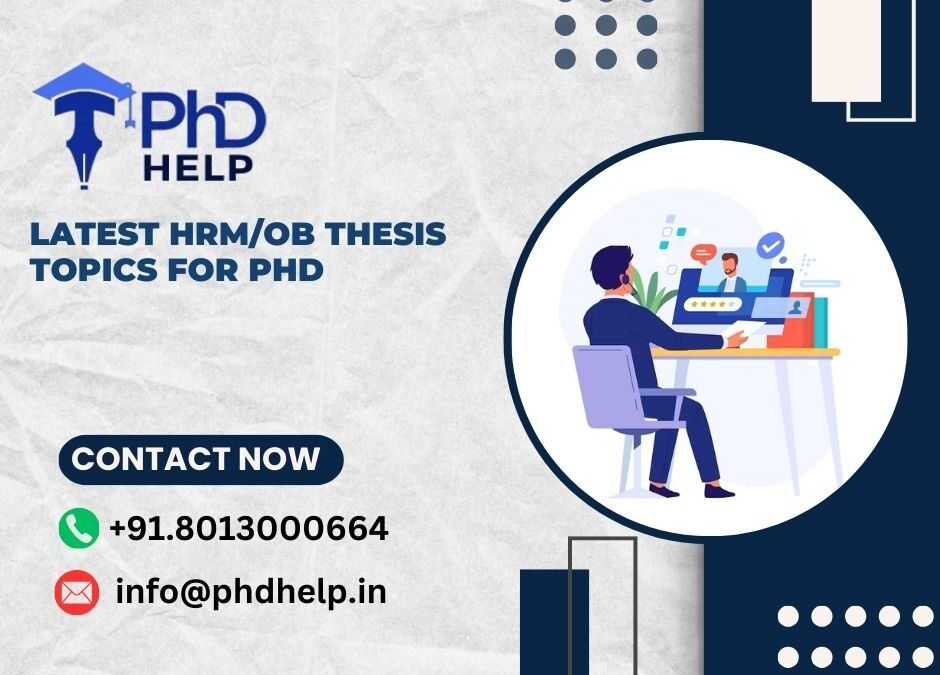Latest HRM/OB Thesis Topics for PhD
Latest HRM/OB Thesis Topics for PhD. In today’s dynamic corporate ecosystem, Human Resource Management (HRM) and Organizational Behavior (OB) are pivotal in shaping sustainable, innovative, and high-performing workplaces. As organizations adopt advanced technologies, diverse workforce models, and evolving leadership frameworks, the demand for cutting-edge PhD research in HRM/OB has never been greater. Below, we provide a rich, structured, and keyword-optimized list of the latest HRM and OB thesis topics suitable for doctoral research and capable of addressing real-world organizational challenges.
Strategic HRM and Organizational Effectiveness
1. Strategic Human Resource Management in Agile Organizations
Examine how agile methodologies are transforming traditional HR structures and contributing to faster decision-making, cross-functional collaboration, and enhanced organizational responsiveness.
2. Linking HRM Practices to Sustainable Competitive Advantage
Analyze how strategic HRM practices like talent management, performance-based rewards, and employee empowerment create long-term competitive differentiation.
3. HRM’s Role in Digital Business Transformation
This topic investigates how HR leaders facilitate digital transformation by managing change resistance, reskilling initiatives, and fostering a tech-positive culture.
Employee Engagement, Well-being, and Retention
4. Remote Work and Its Impact on Employee Engagement
Explore how remote and hybrid work models affect employee motivation, inclusion, and engagement—with a focus on communication tools, performance tracking, and work-life balance.
5. Employee Well-being Programs and Organizational Performance
A thesis could measure the impact of well-being initiatives (mental health support, wellness apps, flexibility) on employee productivity, retention, and absenteeism rates.
6. Generational Differences in Employee Retention Strategies
Investigate how Gen Z, Millennials, Gen X, and Boomers respond to varying retention policies such as learning opportunities, feedback mechanisms, and work culture alignment.
Leadership and Organizational Behavior
7. Transformational Leadership and Employee Creativity
Examine how transformational leaders inspire innovation and creative problem-solving in teams, particularly in industries undergoing rapid change.
8. Toxic Leadership and Its Effects on Organizational Citizenship Behavior (OCB)
Explore how abusive or narcissistic leadership styles undermine employee trust, morale, and discretionary work behavior such as OCB.
9. Mindful Leadership and Emotional Intelligence in Modern Workplaces
This research evaluates how emotionally intelligent leaders who practice mindfulness can reduce burnout, increase team cohesion, and improve psychological safety.
Diversity, Equity, and Inclusion (DEI) in the Workplace
10. Gender-Inclusive Leadership Development in Corporates
Focus on how companies design leadership development programs that break gender stereotypes, promote female leadership, and build inclusive pipelines.
11. Managing Multigenerational and Multicultural Teams
Explore strategies that HRM professionals adopt to harmonize value systems, communication preferences, and workplace expectations in diverse teams.
12. Unconscious Bias Training and Its Organizational Impact
Analyze the effectiveness of bias mitigation programs in hiring, promotions, and team dynamics, with measurable outcomes in diversity representation.
Technology, AI, and HR Analytics
13. HR Analytics and Data-Driven Talent Management
Explore how predictive analytics and AI tools help HR departments make data-informed decisions in recruitment, succession planning, and employee engagement.
14. Ethical Concerns in AI-Based Recruitment Systems
Study the ethical implications of using algorithm-driven hiring tools, focusing on transparency, discrimination, and candidate privacy concerns.
15. Blockchain Technology in Human Resource Information Systems (HRIS)
Investigate how blockchain ensures data integrity, verification of credentials, and secure employee records management in future-ready organizations.
Organizational Culture and Change Management
16. Cultural Intelligence and Global HRM Practices
Examine how cross-cultural HRM approaches impact global employee engagement, expatriate performance, and organizational adaptability.
17. Organizational Culture as a Catalyst for Innovation
Study how organizational values, symbols, and norms shape innovation outcomes, especially in tech startups and creative industries.
18. Resistance to Change and Employee Adaptability During Organizational Restructuring
Research how employees cope with organizational change, identifying the psychological processes and HR interventions that ease transitions.
Talent Acquisition, Development, and Employer Branding
19. Employer Branding and Talent Attraction in the Post-Pandemic Era
Examine how employer brand perception influences candidate decision-making in competitive labor markets, especially in tech, healthcare, and education sectors.
20. Gamification in Talent Acquisition and Onboarding
Explore how game-based assessments, simulations, and interactive onboarding enhance candidate experience, skill fit assessment, and early engagement.
21. Continuous Learning Culture and Employee Skill Development
This topic focuses on how learning ecosystems (LMS platforms, microlearning, peer coaching) help create an adaptive workforce ready for future disruptions.
Performance Management and Organizational Development
22. Evolving Performance Appraisal Systems in Hybrid Work Models
Study how real-time feedback, continuous performance reviews, and peer evaluation tools are reshaping traditional performance appraisal methods.
23. Linking Organizational Development Interventions to Business Outcomes
A valuable thesis could assess how OD practices like team building, training, and conflict resolution drive tangible business metrics such as ROI, innovation rate, and market agility.
Industrial Relations and Employee Voice
24. Trade Unions in the Digital Workplace: Challenges and Evolution
Analyze how trade unions are adapting to the gig economy, platform-based work, and digital communication tools to remain relevant.
25. Employee Voice in Non-Unionized Organizations
Research how non-union voice mechanisms (suggestion systems, open-door policies, digital forums) affect job satisfaction, trust, and organizational commitment.
Conclusion: Advancing HRM and OB Research for the Future of Work
The field of Human Resource Management and Organizational Behavior continues to evolve, driven by technological innovation, social responsibility, and employee-centric values. Each of these PhD thesis topics presents a unique opportunity to contribute meaningfully to the strategic transformation of workplaces, the advancement of leadership science, and the creation of inclusive, data-driven, and resilient organizations.
Doctoral candidates are encouraged to align their research with real-world organizational challenges and future-forward themes that push the boundaries of traditional HRM and OB scholarship.
Thank you for read our blog “Latest HRM/OB Thesis Topics for PhD”
Also read our more BLOG here
For PhD writing help Contact: +91.8013000664 || info@journalwritinghelp.com

